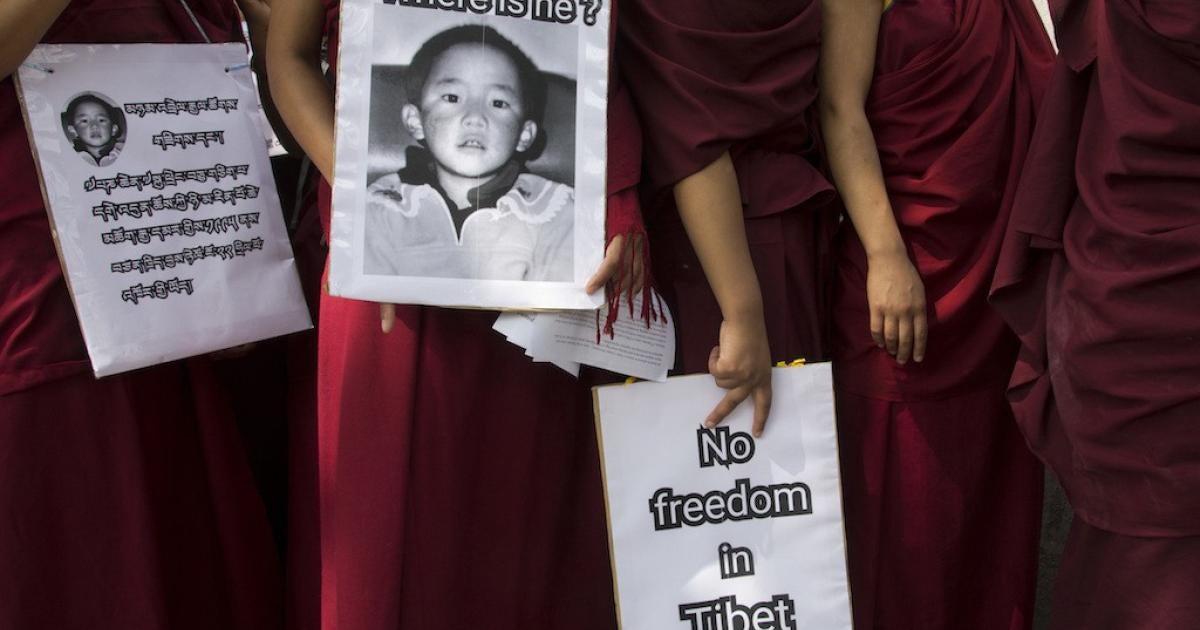
Panchen Lama Forcibly Disappeared For 30 Years: China/Tibet
China ‘s government should free the 11th Panchen Lama Gendun Choki Nyima and his parents, whom Chinese authorities forcibly disappeared on May 17, 1995, and who have not been seen for 30 years, Human Rights Watch said today.
The Panchen Lama and the Dalai Lama, Tibet’s religious leader, have historically played key roles in recognizing the other’s successor. As the current 14th Dalai Lama will celebrate his 90th birthday on July 6, the question of his succession-and the future of Tibetan Buddhism and the Tibetan people-is becoming increasingly urgent.
“The Chinese government kidnapped a 6-year-old and his family and have disappeared them for 30 years to control the selection of the next Dalai Lama and thus Tibetan Buddhism itself,” said Yalkun Uluyol, China researcher at Human Rights Watch. “Concerned parties should press the Chinese government to end this cruelty and secure the freedom of Gendun Choki Nyima and his family.”
The Chinese government forcibly disappeared the then 6-year-old on May 17, 1995, three days after the Dalai Lama recognized him as the 11th Panchen Lama. Even pictures of Gendun Choki Nyima, along with those of the Dalai Lama, are prohibited in Tibet.
Following the Panchen Lama’s disappearance, the authorities forced another group of monks to identify a different child, Gyaltsen Norbu, whose parents were reportedly members of the Chinese Communist Party, as the official reincarnation.
Authorities also detained Jadrel Rinpoche, the abbot of Tashi Lhunpo Monastery who oversaw the search for the Panchen Lama’s reincarnation, and arrested more than 30 monks from the monastery. Jadrel Rinpoche’s whereabouts and well-being are also unknown, according to the Dalai Lama.
Twenty years after his disappearance, in 2015, the Chinese authorities claimed that Gendun Choki Nyima was “living normally” and “does not want to be disturbed by anyone.”
Over the next decade, the Chinese government tightened its grip over Tibet, which includes the Tibet Autonomous Region and the neighboring Tibetan autonomous areas within Qinghai, Sichuan, Gansu, and Yunnan provinces.
Since 2008, when a massive crackdown on popular protests swept the Tibetan plateau, Chinese security forces have maintained a heavy presence in Tibet and tightly restricted access and travel to Tibetan areas. Any questioning of government policies, however mild, can result in arbitrary detention or long-term imprisonment, prosecution, enforced disappearance, and even instances of torture. Authorities maintain highly intrusive mass surveillance systems in Tibet, require Tibetans to use Mandarin Chinese as the medium of instruction in schools, and pressure many to relocate en masse from their long-established villages to new government-built settlements. Authorities also make it extremely difficult for Tibetans to travel abroad or to obtain passports and punish people severely for contacting relatives or others outside the country.
Since 2007, Chinese authorities have imposed regulations limiting the recognition of reincarnate lamas, who include many of the religious leaders in Tibetan Buddhism. These provisions specify that reincarnations may not be recognized without state approval and must be born within China’s borders. High-ranking incarnations must be selected using the “Golden Urn,” an 18th century Chinese lottery system that had scarcely been used by Tibetans until 2007, when the Chinese Communist Party mandated it as the only legal way to select top-ranking lamas.
Since 2009, there have been 160 instances of self-immolation, resulting in the death of 127 Tibetans.
In 2012, the government placed nearly all Tibetan monasteries under the direct control of Chinese government officials who are permanently stationed in Tibet. Since 2018, Chinese authorities have required all monastics to meet the “Four Standards,” including “political reliability” and “being dependable at critical moments.” These standards are believed to involve support for the Chinese government’s choice of the next Dalai Lama and any other reincarnate lama.
Five United Nations human rights mandates, including the Working Group on Enforced or Involuntary Disappearances and the Special Rapporteur on freedom of religion or belief, in a joint statement on the 25th anniversary of the Panchen Lama’s abduction, condemned “the continued enforced disappearance of Gedhun Cheokyi Nyima, and the regulation of reincarnation of Tibetan living Buddhas against the religious traditions and practices of the Tibetan Buddhist minority.”
Enforced disappearance is defined under international law as the arrest or detention of a person by state officials or their agents followed by a refusal to acknowledge the deprivation of liberty, or to reveal the person’s fate or whereabouts.
Various governments and independent bodies, including most recently the European Parliament, have called on the Chinese government to provide information on the whereabouts of the Panchen Lama.
The Chinese government should allow UN monitors, independent human rights organizations, and media outlets unfettered access to Tibetan areas, Human Rights Watch said.
Concerned governments, especially those with significant Buddhist populations, such as Japan, South Korea, Mongolia, Taiwan, and India, should mark the 30th anniversary of the Panchen Lama’s enforced disappearance by speaking out publicly and by asserting the rights of Tibetans to exercise their religious freedom.
“The 30th anniversary of the Panchen Lama’s disappearance provides governments an important opportunity to urge the Chinese government to end its decades of repression of the Tibetan people,” Uluyol said.
https://www.hrw.org/news/2025/05/15/china/tibet-panchen-lama-forcibly-disappeared-30-years

